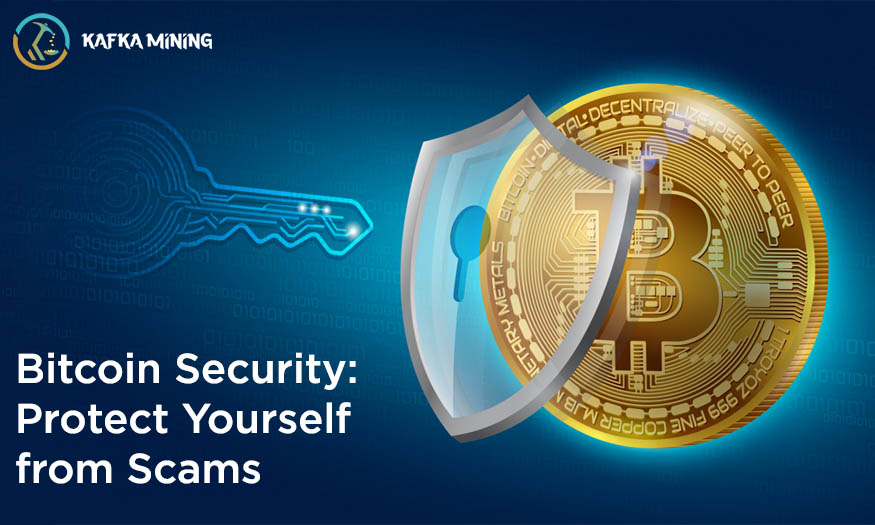
In the digital age, securing your assets, especially cryptocurrency like Bitcoin, is paramount. With the increasing prevalence of scams and cyber threats, it's essential to understand how to protect yourself and your investments. This blog aims to provide valuable insights into avoiding Bitcoin scams and enhancing your security measures. Whether you're a seasoned investor or new to the world of cryptocurrency, understanding the risks and taking proactive steps to mitigate them is crucial. From identifying common scams to implementing robust security practices, we'll cover everything you need to know to safeguard your Bitcoin holdings. By the end of this blog, you'll be equipped with the knowledge and tools necessary to navigate the cryptocurrency landscape safely and confidently. Join us as we delve into the intricacies of Bitcoin security and empower you to protect your digital assets effectively.
With the surge in Bitcoin's value, the frequency of scam attempts has also increased. Bitcoin holders must recognize potential scams and adopt preventive measures. While malware poses a threat, most scams involve deceiving individuals rather than hacking systems to steal Bitcoin. Understanding these scams and implementing protective measures is vital for responsible Bitcoin ownership.
Social Media Giveaways and Impersonation Scams
Social media giveaways and impersonation scams are prevalent and highly publicized methods employed by scammers to pilfer Bitcoin or gain unauthorized access to your wallet. These schemes often entice users by promising to double the amount of Bitcoin sent or requiring Bitcoin transfers for the chance to win substantial rewards. Leveraging fake accounts or bots, these scams mimic credible or renowned personalities, amplifying their apparent legitimacy. It's crucial to exercise caution when encountering such offers; if an opportunity appears overly advantageous, it's likely a scam.
Phishing
Phishing scams are prevalent across the finance and banking sectors, including in the realm of Bitcoin. These scams involve impersonating your bank, Bitcoin wallet, or exchange provider through various means such as fake emails, imitation websites, or deceptive links. Typically, phishing emails contain links that lead to counterfeit websites resembling your exchange or wallet platform. Once redirected, users are prompted to input their account credentials, enabling scammers to illicitly access genuine accounts.
Bitcoin Ponzi Schemes
A Ponzi scheme is a fraudulent tactic that lures investors with the allure of extraordinary profits. Here, early investors are paid with funds from new participants, creating a false impression of success. Eventually, the scheme collapses when it becomes unsustainable. Ponzi schemes often promise unrealistic returns and rely on continuously recruiting new investors to sustain payouts. It's crucial to be wary of schemes guaranteeing unusually high returns, as they are typically deceptive and unsustainable.
Blackmail
Blackmail, whether conducted through phone calls or emails, is a nefarious tactic employed by hackers to exploit fear and coerce individuals into providing access or sending them Bitcoin. Typically, these scammers claim to possess incriminating evidence against their targets and threaten to disclose it to their contacts unless Bitcoin is transferred to them. In reality, these claims are often baseless, and the hackers lack any actual information about their victims. Their strategy relies on sheer volume, as they bombard numerous individuals with emails or calls, hoping to persuade at least a few into complying with their demands by instilling fear and urgency. It's essential to recognize these attempts as fraudulent and refrain from succumbing to their threats, as yielding to such demands only perpetuates the cycle of extortion and emboldens the scammers.
Computer Viruses and Malware
Malware poses a significant risk to the security of your Bitcoin wallet and can have severe consequences if not addressed promptly. It often infiltrates computers or personal devices under the guise of legitimate software downloads. Once installed, malware discreetly operates in the background, covertly monitoring your web browser activity to intercept sensitive Bitcoin wallet information. This deceptive tactic allows malicious actors to gain unauthorized access to your funds and compromise the security of your digital assets. Therefore, it's crucial to remain vigilant and adopt robust cybersecurity measures to safeguard against potential malware attacks and protect the integrity of your Bitcoin holdings.
1. Safeguard your wallet seed and online account password, avoiding sharing them with anyone.
2. Be cautious of offers promising free or high returns; they're likely scams.
3. Open emails only from known addresses to prevent phishing attempts.
4. Verify links before clicking and ensure the website matches the intended destination.
5. Bookmark trusted exchange and Bitcoin sites to access them directly.
6. Download software only from secure sites with "https" URLs.
7. Keep antivirus software updated to defend against malware.
8. Thoroughly research exchanges, wallets, and investments before engaging.
9. Enable 2-factor authentication for added security, preferably non-SMS methods.
10. Verify addresses before sending Bitcoin to prevent accidental transfers.
Important Points to Remember
1. Bitcoin's value attracts scammers aiming to exploit uninformed individuals.
2. Bitcoin transactions are irreversible; exercise caution when sending them, unlike credit card payments.
3. Scams often involve social engineering tactics, such as promising high returns or requesting Bitcoin.
Leave a Comment